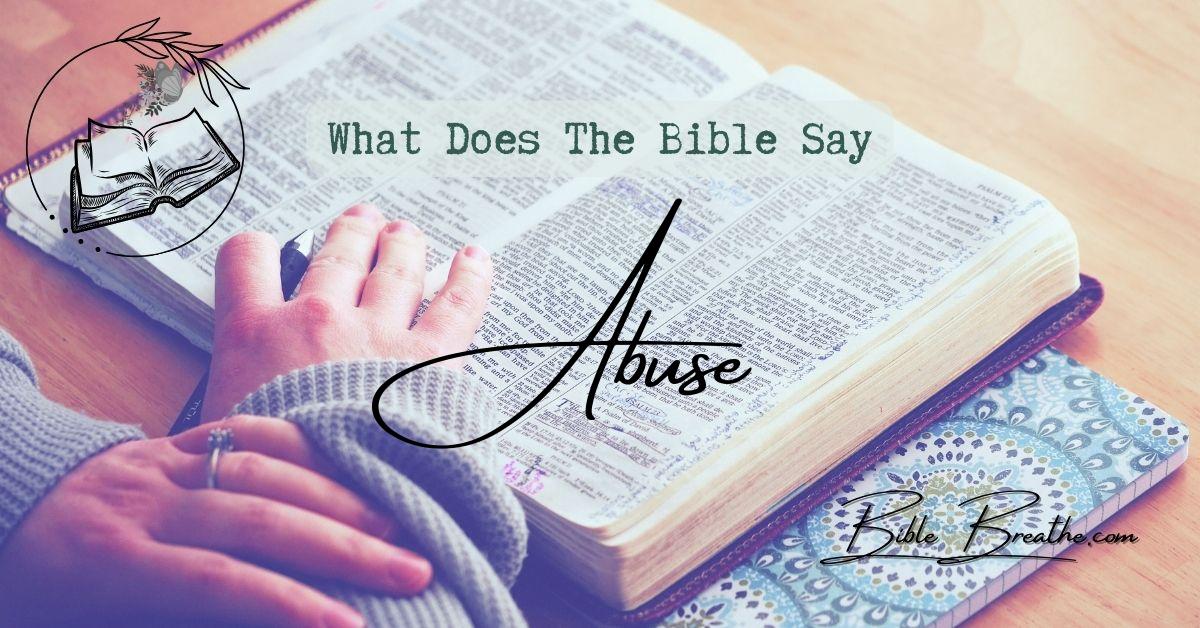What’s the Bible’s take on abuse, fam?
It’s like stepping into a dark room, trying to find the light.
Abuse ain’t just physical punches; it’s the twisted world of emotional hurt, verbal wounds, and more.
But before we dive into these deep waters, let’s break it down.
Abuse, it’s like a toxic brew of selfishness, deceit, and manipulation.
The Bible talks about righteous anger, but also warns about a sinful heart.
To grasp this, we gotta get rid of those misunderstandings.
Seeing abuse through the Bible’s lens ain’t just about finger-pointing.
It’s about the power of loving one another, the duty to protect the hurting, and finding our way to healing and accountability.
As we sail through biblical teachings on abuse, we’ll walk through tales of mistreatment, learn how hearts can change, and find the path to healing from abuse.
The Bible’s our guide to building a better, more loving community.
Let’s do this, fam!
🌟
Key Takeaways
- The Bible unequivocally condemns all forms of abuse, emphasizing the sanctity of human life and dignity.
- It underscores the importance of addressing abuse by seeking healing, holding perpetrators accountable, and fostering a supportive community.
- The transformative power of Jesus’ love and teachings provides hope and strength for survivors of abuse, offering a path to healing and restoration.
- Combating abuse within faith communities requires a commitment to creating safe spaces and implementing preventive measures.
- Understanding the Bible’s teachings on abuse encourages individuals and communities to actively promote love, compassion, and justice, working towards a world free from all forms of mistreatment.
Unraveling the Bible’s Perspective on Abuse
Photo modified by BibleBreathe.com. Original photo by Odonata Wellnesscenter on Pexels
In the intricate tapestry of human relationships, there’s a thread that often weaves its way into our lives, and it’s called abuse.
But what exactly does the Bible have to say about this deeply troubling issue?
Let’s dive right in and decode the wisdom it holds.
Defining “Abuse”
Abuse, much like a looming storm cloud, takes on various forms.
It’s not confined to physical wounds; it extends its sinister grasp into the territories of emotional abuse and other subtle but harmful manifestations.
Imagine it this way: abuse is like a weather system that can manifest as a raging hurricane of physical violence, an unending downpour of verbal assaults, or a suffocating fog of manipulation and deception.
Now, you might wonder, where does abuse originate?
It’s like peeling the layers of an onion to uncover its core.
Abuse often finds its roots in the depths of a sinful heart, where selfishness takes hold.
In the Bible, it’s crystal clear that when we prioritize our desires over the well-being of others, mistreatment becomes an unfortunate option.
“And as ye would that men should do to you, do ye also to them likewise.” – Luke 6:31 (KJV)
Here, Jesus hands us a golden rule, a moral compass that helps us gauge our actions.
Abuse, in all its forms, stands in stark contrast to this principle of love and empathy.
The Role of Anger and Its Distinction from Abuse
Anger, like a fire, can be either a source of warmth or a destructive force.
It’s not inherently sinful; it’s how we wield it that counts.
Righteous anger, much like a vigilant guardian, arises when we witness injustice or wrongdoing.
It fuels our quest for justice and change, much like a firefighter battling a blaze.
But when anger transforms into a tool for abuse, it morphs into a weapon of destruction.
Biblical Guidance on Abuse
The Bible doesn’t remain silent on the matter of abuse.
It serves as a sacred compass, directing us toward healthier relationships and healing from abuse.
Within its teachings, we discover protection for the vulnerable, accountability for wrongdoers, and a call to genuinely love one another.
Beloved, let us love one another: for love is of God; and every one that loveth is born of God, and knoweth God.” – 1 John 4:7 (KJV)
In this verse, we catch a glimpse of God’s message: love and care for one another.
It’s a guiding light for those who have endured abuse, leading them toward recovery.
So, as we embark on this journey to explore what the Bible says about abuse, remember, it’s not just a historical document; it’s a timeless guide offering comfort, wisdom, and the path to healthier, more loving relationships.
Unveiling the Bible’s Perspective on Abuse
Photo modified by BibleBreathe.com. Original photo by Karolina Grabowska on Pexels
Hey there, friends!
Today, we’re diving into a topic that’s often shrouded in mystery: what does the Bible have to say about abuse?
You might think of abuse as just physical, but hold on tight because there’s more to it than meets the eye.
Emotional Abuse and Its Subtlety
Emotional abuse, my friends, is like a quiet storm that sneaks up on you.
It’s the wolf in sheep’s clothing, lurking where you least expect it.
The Bible knows about this sly devil and warns us about the dangers it poses to our hearts and relationships.
“A wicked man puts on a bold face, but the upright gives thought to his ways.” – Proverbs 21:29 (KJV)
The Challenges in Detecting Emotional Abuse
Spotting emotional abuse is like trying to find a needle in a haystack.
It can pretend to be concern when it’s really manipulation in disguise.
The Bible encourages us to be smart and wise in our interactions, guarding our hearts against deceit.
“Test everything; hold fast what is good.” – 1 Thessalonians 5:21 (KJV)
Examples of Emotional Abuse: Manipulation, Deceit, Threats, etc.
Emotional abuse wears many masks, like a chameleon changing its colors.
It can show up as manipulation, deceit, threats, and more.
The Bible gives us stories and teachings that paint a vivid picture of these destructive behaviors and the consequences they bring.
“He who is often reproved, yet stiffens his neck, will suddenly be broken beyond healing.” – Proverbs 29:1 (KJV)
So, as we dig into what the Bible says about abuse, we discover not only warnings about its subtle nature but also guidance on how to spot and deal with it.
In a world where emotional abuse can be as hurtful as any physical harm, Scripture becomes our guiding star towards healthier hearts and relationships.
Stay tuned, my friends!
We’ll keep exploring this important topic, knowing that the Bible offers not only warnings but also a path to healing and restoration.
Breaking the Chains of Abuse: Insights from the Bible
Photo modified by BibleBreathe.com. Original photo by Odonata Wellnesscenter on Pexels
As we journey deeper into what the Bible says about abuse, we uncover the intricate web of this issue, resembling a tangled thicket.
In this section, we’ll shed light on the cycle of abuse and its profound impact, especially on children.
Moreover, we’ll delve into the biblical perspective on abusive parenting and the far-reaching consequences it entails.
Recognizing Patterns of Abuse and Offering Support
Visualize abuse as an unrelenting storm, leaving behind a trail of devastation.
It operates in patterns, like relentless waves crashing upon the shore, each wave more destructive than the last.
Victims often find themselves ensnared in this cycle, desperately seeking liberation.
The Bible, in its teachings, calls us to discern these patterns and to step in, much like a lifeguard rescuing someone caught in treacherous waters.
It underscores the significance of breaking these cycles and providing assistance to those who have endured emotional and physical violence, verbal assaults, and other forms of abuse.
“He defendeth the cause of the fatherless and widow, and loveth the stranger, in giving him food and raiment.” – Deuteronomy 10:18 (KJV)
This verse reveals God’s heart as a protector of the vulnerable.
It’s a rallying cry, urging us to be advocates for those who cannot defend themselves.
Safeguarding Children from Harm
Children, like delicate blossoms, are particularly vulnerable to the harsh winds of abuse.
The Bible, in its wisdom, emphasizes the importance of shielding them from harm.
It’s akin to constructing a sturdy shelter to shield them from the storms of mistreatment.
But whoso shall offend one of these little ones which believe in me, it were better for him that a millstone were hanged about his neck, and that he were drowned in the depth of the sea.” – Matthew 18:6 (KJV)
Jesus’ words here carry a weighty message: the gravity of causing harm to children is severe.
It’s a poignant reminder of our duty to create a safe and nurturing environment for the young ones, safeguarding them from the destructive forces of abuse.
Consequences of Abusive Parenting from a Biblical Perspective
Parenting is a sacred responsibility, akin to tending a garden.
When parents engage in abusive behavior, it’s like contaminating the soil from which their children’s lives sprout.
The Bible sheds light on the repercussions of such actions, underscoring the need for transformation and healing.
“Fathers, provoke not your children to anger, lest they be discouraged.” – Colossians 3:21 (KJV)
This verse encourages parents to nurture their children’s growth with love and guidance, not with harshness and abuse.
It reminds us that our actions as parents carry a profound impact on the emotional and spiritual well-being of our children.
In conclusion, as we ponder the Bible’s teachings about abuse, let’s remember that it doesn’t just offer condemnation but also guidance, healing, and hope.
It calls us to break the chains of abuse, protect the vulnerable, and cultivate a culture of love and compassion where victims of abuse find solace and support.
The Bible’s Stand Against Abuse: A Call to Love and Compassion
Photo modified by BibleBreathe.com. Original photo by Designecologist on Pexels
Hey there, my dear friends!
Today, we’re on a journey through the ancient words of the Bible, uncovering its powerful message about abuse and the principles that uphold a just and compassionate society.
The Command to Love One Another and How Abuse Opposes It
Right at the core of the Bible’s teachings is the command to love one another.
This isn’t just a suggestion; it’s the very foundation that stands against all forms of abuse.
Imagine this command as the solid bedrock of a building, and abuse as the destructive force trying to chip away at it.
When we mistreat others, we’re going against this fundamental directive.
“A new commandment I give to you, that you love one another: just as I have loved you, you also are to love one another.” – John 13:34 (KJV)
Biblical Passages Condemning Abuse and Taking Advantage of Others
The Bible doesn’t turn a blind eye to abuse; it faces it head-on.
Within its pages, we find strong condemnation for those who exploit and harm others.
It’s like a courtroom where justice is served, and the guilty are held accountable.
He has told you, O man, what is good; and what does the Lord require of you but to do justice, and to love kindness, and to walk humbly with your God?” – Micah 6:8 (KJV)
The Universal Guilt of Abuse and the Need for Jesus’ Love
The Bible acknowledges that we all fall short, and abuse is a guilt we share universally.
It’s like a shadow that can cast darkness even on the purest of hearts.
But here’s the good news—it doesn’t leave us in despair.
It offers us a lifeline of hope through Jesus’ love and forgiveness.
For all have sinned and fall short of the glory of God.” – Romans 3:23 (KJV)
Healing from Abuse and the Role of PASTORal Counseling
Recognizing abuse is the first step, but so is the path to healing.
The Bible provides guidance on how to recover from the wounds of abuse and find solace.
And when you need that extra support, PASTORal counseling can be a beacon of light on this journey, offering the wisdom and care you need.
“He heals the brokenhearted and binds up their wounds.” – Psalm 147:3 (KJV)
As we dive into the Bible’s stance on abuse, we not only discover its clear condemnation of this destructive behavior but also a call to compassion, love, and healing.
It reminds us that we’re all called to a higher standard, where abuse has no place, and the love of Jesus can transform even the darkest of hearts.
Stay with us as we delve deeper into specific aspects of biblical teachings related to abuse, offering insights and guidance for those seeking to understand and address this crucial issue.
Finding Healing and Hope in Jesus: A Path to Recovery
Photo modified by BibleBreathe.com. Original photo by PhotoMIX Company on Pexels
In the midst of the darkness that abuse casts over lives, there shines a beacon of hope and healing in the person of Jesus Christ.
In this section, we’ll explore the profound role that Jesus plays in mending the wounds left by abuse and how turning to Him can bring peace, comfort, and restoration.
Jesus, the Ultimate Healer of Wounds
Imagine Jesus as the master physician of the soul, capable of mending the deepest and most agonizing scars.
When we endure abuse, our hearts and spirits bear the weight of emotional and physical violence, verbal attacks, and the trauma of manipulation and deceit.
But just as a skilled surgeon can mend broken bones, Jesus has the power to heal our wounded hearts.
“He healeth the broken in heart, and bindeth up their wounds.” – Psalm 147:3 (KJV)
These words from the Psalms vividly portray Jesus as the divine healer, binding up our wounds with His love and compassion.
Finding Peace and Comfort in Jesus
In the turbulent sea of abuse, finding peace can seem like an elusive dream.
However, turning to Jesus is like finding refuge in a sturdy lighthouse amid a raging storm.
His words offer solace, and His presence is like a comforting embrace.
Come unto me, all ye that labour and are heavy laden, and I will give you rest.” – Matthew 11:28 (KJV)
These words from Jesus extend an invitation to all burdened by the weight of abuse.
He offers rest for our weary souls, a sanctuary from the storms of mistreatment.
Jesus’ Tender Care for His Followers, Especially the Suffering
Visualize Jesus as a loving shepherd, diligently caring for His flock.
He is acutely aware of the suffering endured by His followers, especially those who have been victims of abuse.
He is not distant; rather, He walks alongside them, offering His guidance and love.
“The Lord is nigh unto them that are of a broken heart; and saveth such as be of a contrite spirit.” – Psalm 34:18 (KJV)
These words from the Psalms reassure us that Jesus is close to those with broken hearts and contrite spirits.
He is not a distant deity but a compassionate Savior who draws near to the suffering.
In conclusion, as we contemplate the Bible’s teachings about abuse and the role of Jesus in healing, we discover a message of hope and restoration.
Jesus is the source of healing, peace, and comfort for those who have endured the pain of mistreatment.
Turning to Him is like finding an oasis in the desert, a place of refreshment and renewal on the journey to recovery.
Embracing Accountability and Recovery: A Biblical Path Towards Healing
Photo modified by BibleBreathe.com. Original photo by RDNE Stock project on Pexels
Hey there, my dear friends, as we continue our journey through the Bible’s wisdom on addressing abuse, we find ourselves at a crucial crossroads where accountability and recovery take center stage.
These elements are like bridges that carry us from the darkness of abuse into the healing and restoration we so deeply crave.
The Need for Believers to Acknowledge Their Abusive Behaviors
Picture accountability as a mirror that reflects our actions and attitudes.
It’s not always easy to gaze into this mirror, especially when it shows us behaviors that have hurt others.
Yet, the Bible calls us to confront our abusive tendencies and seek transformation.
“If we say we have no sin, we deceive ourselves, and the truth is not in us. If we confess our sins, he is faithful and just to forgive us our sins and to cleanse us from all unrighteousness.” – 1 John 1:8-9 (KJV)
The Role of PASTORal or Biblical Counseling in Recovery
Recovering from abuse often demands guidance and support.
PASTORal or biblical counseling serves as a trusted compass on this journey.
Think of it as having a wise guide to help you navigate the challenging path of healing, offering insights and strategies rooted in the wisdom of Scripture.
“Where there is no guidance, a people falls, but in an abundance of counselors there is safety.” – Proverbs 11:14 (KJV)
The Importance of Community in Bearing One Another’s Burdens
In the beautiful tapestry of faith, community is the thread that binds us together.
When it comes to recovering from abuse, having a supportive community is priceless.
It’s like a safety net that catches us when we stumble.
The Bible encourages us to share each other’s burdens, offering comfort and strength.
“Bear one another’s burdens, and so fulfill the law of Christ.” – Galatians 6:2 (KJV)
As we dive into the profound subject of what the Bible says about abuse, we discover that it not only condemns abusive behavior but also provides a roadmap for transformation and healing.
It calls us to acknowledge our faults, seek guidance through counseling, and lean on the strength of our faith community.
In the upcoming sections, we’ll delve even deeper, offering practical steps and insights for accountability and recovery.
We’ll shine a light on how the principles of the Bible can guide us toward a life free from the chains of abuse.
Stay with us on this journey, my friends.
Frequently Asked Questions (FAQs) About What Does The Bible Say About Abuse
Is all anger considered abusive according to the Bible?
The Bible acknowledges anger but advises against uncontrolled and destructive anger.
It suggests addressing issues calmly and seeking reconciliation.
Righteous anger, when directed at injustice, can be valid, but it should be tempered and not lead to sin.
How does the Bible differentiate between righteous anger and sinful anger?
The Bible permits righteous anger when it’s a response to injustice or sin.
Ephesians 4:26 advises, ‘In your anger do not sin.’ Sinful anger involves uncontrolled, selfish, or vindictive emotions.
Righteous anger seeks justice, while sinful anger leads to harm.
Discernment and a godly perspective are crucial in distinguishing between them.
What are the biblical solutions for those who have been abused?
The Bible advocates justice, healing, and restoration for the abused.
It promotes support and empathy for victims.
Psalms 147:3 speaks of God’s healing for the brokenhearted.
Galatians 6:2 emphasizes sharing burdens and supporting each other.
Seeking counseling, legal intervention, and finding supportive communities align with biblical principles.
Compassion, justice, and support are central in addressing the aftermath of abuse.







